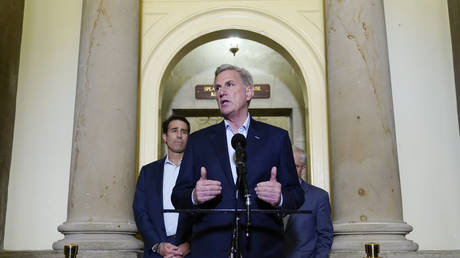Biden and McCarthy reach deal to increase US debt limit
President Joe Biden and House Speaker Kevin McCarthy have reached a “tentative” agreement on raising the US debt ceiling

The “agreement in principle” has yet to pass hardline opposition in Congress
US President Joe Biden and House Speaker Kevin McCarthy have reached a “tentative” agreement on raising the country’s debt ceiling and curbing federal government spending, following a lengthy phone call on Saturday evening. The bill, however, must be finalized and voted through Congress before the government runs out of cash to pay its bills.
“I believe this is an agreement in principle that’s worthy of the American people. It has historic reductions in spending, consequential reforms that will lift people out of poverty into the workforce, rein in government overreach,” McCarthy told journalists.
“The agreement represents a compromise, which means not everyone gets what they want,” Biden said in a statement. “It is an important step forward that reduces spending while protecting critical programs for working people and growing the economy for everyone.”
The House speaker said the draft bill contains “a lot more,” but said “we still have a lot of work to do,” refusing to take any questions until he informs his fellow party members about the progress. An all-GOP House conference call about the progress in negotiations was scheduled for later on Saturday.
Biden and McCarthy spoke over the phone twice on Saturday, with one conversation lasting over 90 minutes, in an attempt to hammer out a compromise. The “framework deal” was negotiated during these “extended discussions,” but the exact wording has yet to be finalized, amid objections from hardline lawmakers in both the Republican and the Democratic Parties, Bloomberg reported, citing people familiar with the talks.
McCarthy promised to release the text of the bill on Sunday, and hopes to hold a vote on Wednesday – just days before the government is projected to run out of money.
US Treasury Secretary Janet Yellen initially warned that her department could run out of money by June 1, but said on Friday it would likely be able to fulfill its obligations until June 5. Economists warned that if no agreement is reached in time and the US defaults even on some of its bills, it could trigger a market crash and damage confidence in the dollar over the longer term.
The managing director of the IMF, Kristalina Georgieva, criticized Washington’s debt-ceiling impasse, saying a US default would have a significant ripple effect on the world’s economic prosperity.
“The US Treasury market is the anchor of stability for the global financial system,” Georgieva said at a press conference on Friday following the IMF’s Article IV consultation with US economic figures. “You pull the anchor and the world economy – this ship on which we all travel – is in choppy, and, even worse, uncharted waters.”






















